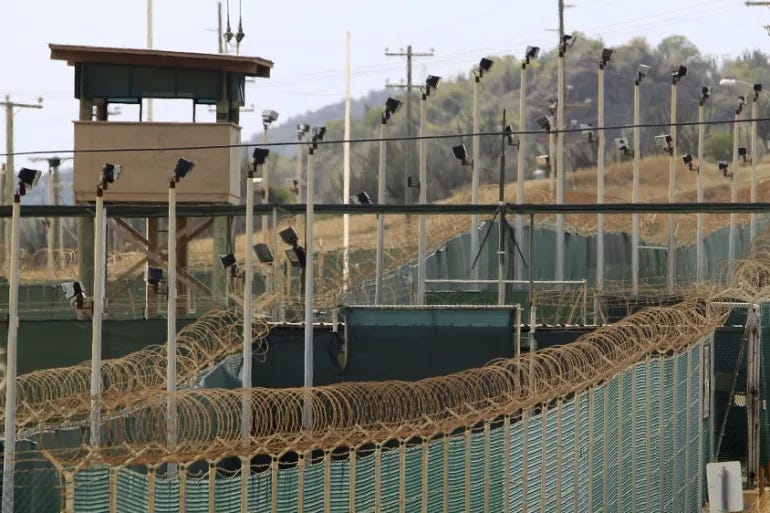
Murray Hunter
Two Malaysians involved in the 2002 Bali bombings released from Guantanamo
Mohammed Nazir bin Lep and Mohammed Farik bin Amin return to Malaysia
Jan 05, 2025

Two Malaysians who pleaded guilty for their roles in the 2002 Bali bombings were in their have arrived back in Malaysia after the United States announced their repatriation from the military prison at Guantanamo Bay, where they were locked up for 18 years.
The duo, Mohammed Farik bin Amin and Mohammed Nazir bin Lep, have been turned over to Malaysian authorities, according to a statement from the home ministry in Kuala Lumpur.
“The unity government has received from the United States government the two Malaysian nationals, Mohammed Farik bin Amin and Mohammed Nazir bin Lep, who were in prison since 2006 at the Guantanamo Bay Detention Camp on the principle of human rights and support for universal justice,” the ministry said in a statement last month.
The statement did not mention whether the two would be sent to a Malaysian prison upon being repatriated from the Guantanamo prison.
In January 2024, a U.S. military judge at Guantanamo Bay sentenced bin Amin and bin Lep to five more years in prison after they pleaded guilty to five charges connected to their supporting roles in twin bombings that killed 202 people, 88 Australians in October 2002 – Indonesia’s deadliest-ever terror attack. Another 240 Australians were injured.
There was a ‘secret deal’ done between the US and Malaysia, where victims families, and the media have no been advised of the details.
Mohd Farik and Mohd Nazir were arrested in Thailand back in 2003, along with Encept Nurjaman, who is known as Hambali, who is believed to be the mastermind of the Bali bombing. All 3 were believed to be taken to a CIA ‘black site’ in Thailand, and tortured. Nazir has recently shown hand drawn pictures of how he was tied up and tortured. In 2006, they were moved to the Guantanamo Bay Detention Camp, and held for 17 years before their trial and plea bargain. They were returned to Malaysia last month.
Both, Mohd Farik and Mohd Nazir claimed they had no prior knowledge of the Bali attack, and were only involved after the event. This was to do with helping to hide the perpetrators in Thailand and moving funds in preparations for future attacks. This appears to be true, according to testimonies in the court case.
The bomb plot was allegedly masterminded by senior members of Jemaah Islamiyah, a hardline Islamist group in Indonesia, including Imam Samudra, Amrozi and Alii Ghufron alias Mukhlas. All three men were executed for their role in the bombing in 2008, while a fourth man, Ali Imron was handed a life sentence after he apologised to the court and expressed remorse for his actions. Ali Imron, serving a life sentence for his role in the 2002 Bali bombing was seeking a presidential pardon, which was objected to by Australian authorities.
The current whereabouts of the two is unknown now. Its not known whether they were returned to their families or placed in a Malaysian prison or other detention system. The home minister Saifuddin Nasution Ismail has said that some arrangements have been made to assist in their rehabilitation.
The return of Mohd Farik and Mohd Nazir to Malaysia comes at a time when the influence of Islamic State (IS) is on the rise. There are many people sympathetic to ISIS within the general population. The low number of terrorist acts in Malaysia is dangerous from the point of view that is creating a culture of complacency.
The lone wolf attack of two police officers last May at the Ulu Tiram police station fits the profile of new ISIS terror strategies. The recent New Orleans attack on new years eve is such an example. More attacks like this can be expected to occur when young people are groomed by recruiters and radicalized. They act as ‘sleepers’ for a period of time and act upon low security targets. Social media, and special WhatApp and Telegram groups allow for communication.
Send them to Afghanistan.
ReplyDeleteThey should not be allowed to return to Malaysia unless fully confirmed on their repentance.
Apparently, since Trump1.0, the base had undergone enlargement...
ReplyDelete~~~~~
https://t.me/geopolitics_live/40460
🔓✈️ US sends 11 Guantanamo prisoners to Oman, 15 remain
The US military has relocated 11 Yemeni prisoners from Guantanamo to Oman, marking the prison's lowest detainee count in 20 years.
None of the released were charged during their detention. The US will fund their housing, education, and rehabilitation, says the NY Times.
👍 Boost us | Chat | Stickers |@geopolitics_live
What all those space for?
ReplyDelete~~~~~
https://x.com/MarioNawfal/status/1876426021840556289?s=19
🇺🇸GUANTANAMO PRISONER COUNT PLUMMETS TO 15
The Biden administration transferred 11 Yemeni detainees to Oman, cutting Guantanamo’s population nearly in half in a single move.
Once holding 680 prisoners, the controversial facility now houses fewer detainees than when it first opened in 2002.
With just 15 men remaining, the push to close the infamous site nears its end—after decades of global criticism over human rights concerns.
Source: Reuters